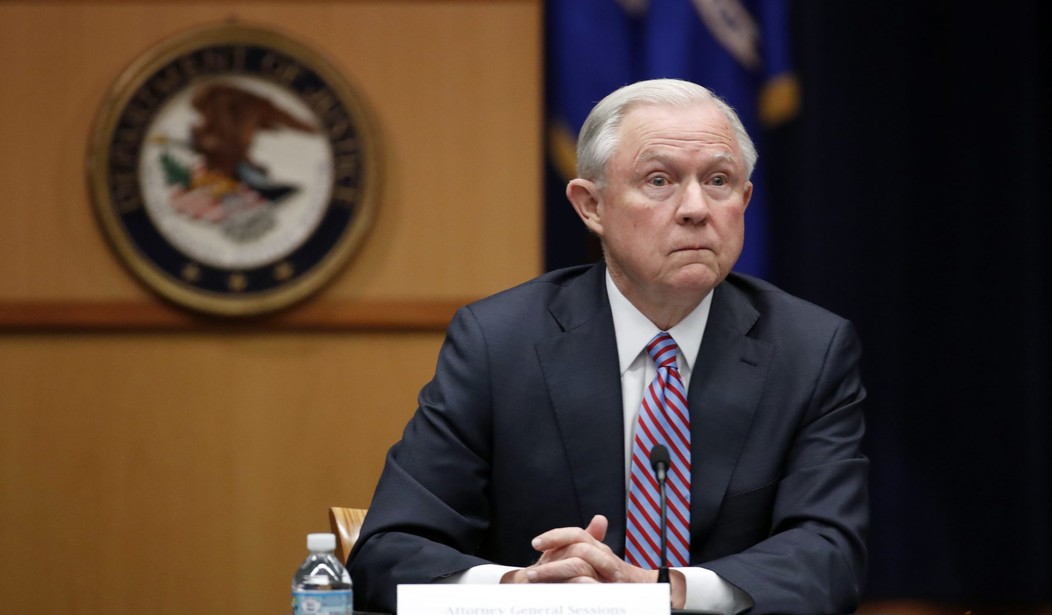Attorney General Jeff Sessions is slated to testify this afternoon before the Senate Intelligence Committee. The hearing is being teed up as the attorney general’s response to former FBI director James Comey’s testimony before the same panel last week.
One important aspect of the hearing is sure to be an effort to define the nature and extent of Sessions’ recusal from involvement in the so-called Russian investigation.
The attorney general’s decision in this regard is clearly among the most consequential of the Trump administration’s first months. As I opined at the time, it was a mistake. Prosecutors should recuse themselves from matters in which their participation would create an appearance of impropriety. The problem with the Russia investigation is that it is not a matter with clear parameters. It is not a criminal investigation or prosecution; it is instead a counterintelligence investigation related to Russia’s interference in the 2016 presidential election. Because such an investigation is designed to gather information not to build a prosecution, it lacks the definitiveness the criminal case, which focuses on whether a defined factual transaction constitutes a violation of penal law.
Thus, not only was a clear basis for Sessions’s recusal lacking. It was inevitable that there would be disputes about the parameters of the recusal.
In point of fact, the word “Russia” does not appear in Sessions’ statement outlining his recusal. The attorney general stated on March 2: “I have decided to recuse use myself from any existing or future investigations of any matters related in any way to the campaigns for President of the United States.”
This is significant. As time passes, we tend to remember recusal decision through the prism of a Senate hearing in late February. In questioning by Senator Al Franken (D., Minn.), Sessions was asked about contacts with Russian officials. Franken set up his questions by referring to a dossier about then-candidate Trump that had been compiled by a former British spy for purposes of opposition research. The dossier contains lurid allegations about Trump’s activities in Russia. Those allegations have never been verified, which is why media outlets had declined to report on the dossier, despite having had it for months.
News of it was just breaking when Franken used it to question Sessions, who was clearly unfamiliar with it and taken aback by Franken’s description of it. When Sessions testified that he had not had contact with Russians, it was clearly in the context of these salacious escapades, from which he was plainly trying to distance himself. He did not mean that he had never met with Russians, but the testimony could certainly be read that way. The testimony was thus inaccurate, but the claim by some Democrats that it amounted to perjury was specious.
After all that, it is unsurprising that we remember the attorney general’s recusal as being specifically related to Russia. The actual articulation of the recusal, however, elucidates that it is based on Sessions’s position as a high-ranking surrogate of the Trump presidential campaign, not on Russia per se. It suggests that he is excluded from all matters related to the 2016 campaign – in fact, since he speaks of recusal from campaigns (plural), there is a good argument that he intended to recuse himself for any investigations related to the Hillary Clinton campaign. But he has not recused himself from all matters related to Russia – just, presumably, investigations directly involving Russia’s meddling in the campaign.
This is important for two reasons.
First, as it has become increasingly clear that there is no evidence of Trump campaign collusion in Russia’s meddling. It is also apparent that special prosecutor Robert Mueller’s jurisdiction is extraordinarily elastic. Consequently, we are apt to find that more and more of what Mueller investigates will have less and less to do with the 2016 election. If Sessions’s recusal is limited to matters related to the campaign, there could well be a collision between the jurisdiction of the special counsel and that of the Justice Department under Sessions’ supervision. Naturally, the media and Democrats will want the attorney general’s supervisory authority narrowed. To the contrary, it is Mueller’s mandate that should be spelled out more definitively. It is the special counsel who needs boundaries.
Second, and relatedly, the amorphous Russia investigation should not be permitted to undermine Sessions’s authority to run the Justice Department. Already, Democrats have protested that, because of his recusal, Sessions should have had nothing to do with the president’s decision to dismiss FBI director Comey. That is ludicrous. The FBI director is one of the attorney general’s most important subordinates. The FBI director runs the agency that is conducting the Russia investigation, but the director is not “running” the investigation as if he were the line agent directly responsible for it. And no matter how important it may be, the Russia investigation represents a negligible percentage of the work of the FBI and the Justice Department. If the attorney general were deemed unable to supervise the FBI director, then he would effectively be unable to supervise the Justice Department.
This cannot have been what the attorney general intended by his recusal.








Join the conversation as a VIP Member